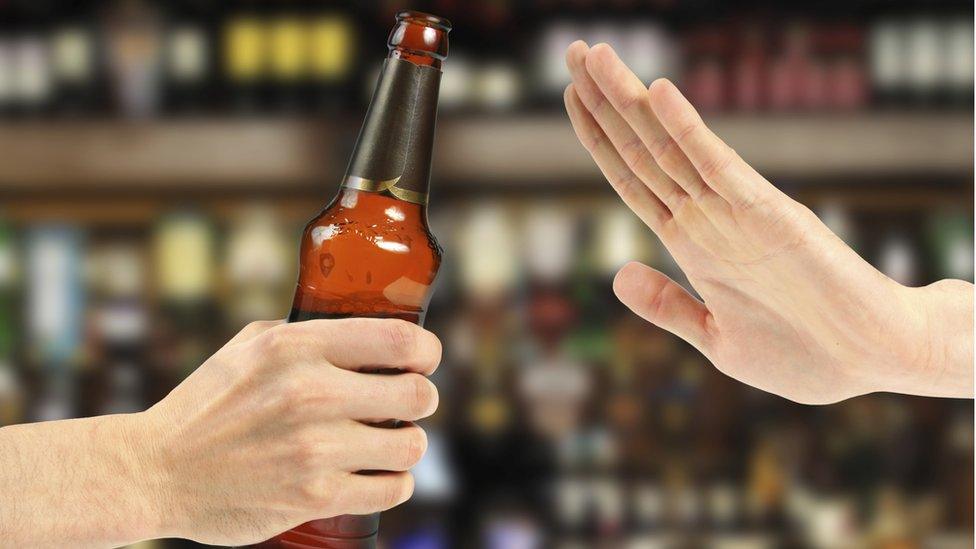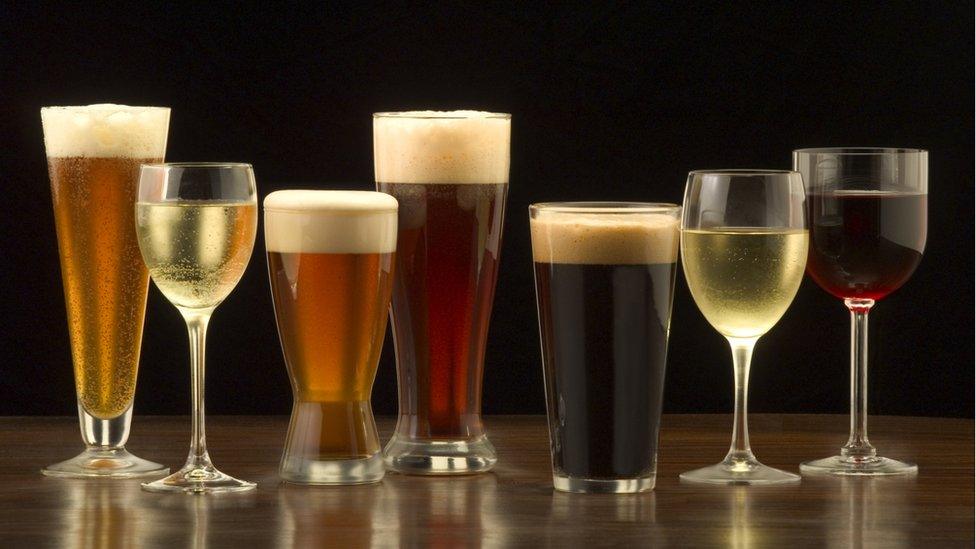Alcohol guidance changes welcomed by Scottish health campaigners
- Published

The new guidance warns that regularly drinking any amount of alcohol increases the risk of developing a range of illnesses
New guidelines on the maximum amount of alcohol people should drink in a week have been welcomed by Scottish health campaigners.
It comes as chief medical officers across the UK changed their guidance on alcohol's impact on health.
Men and women are now both advised to consume no more than 14 units per week - a drop from the previous guidance of 21 units for men.
The change is in response to evidence of the risk of alcohol causing cancer.
The new guidance also takes account of the harmful effects of binge-drinking, and brings the rest of the UK into line with Scotland by advising women not to drink any alcohol during pregnancy.
Want to know more?
It the first time the UK guidelines have been updated since 1995 - although Scotland has updated its guidance, external more recently.
The new guidance also says:
People should have several alcohol-free days a week and not "save up" their 14 units for a binge-drinking session
Anyone who drinks as much as 14 units per week should spread it evenly over three days or more
Heavy drinking sessions can increase the risk of death from long-term illnesses and from accidents and injuries
The risk of developing a range of illnesses including cancers of the mouth, throat and breast, increases with any amount you drink on a regular basis
People should also drink more slowly, consume alcohol with food and alternate alcohol with water
Evidence that alcohol such as red wine is beneficial for health "is considered less strong than it was"
Only women aged 55 and over may benefit from the protective effect of drinking on heart health
Scotland's chief medical officer Dr Catherine Calderwood said she was "pleased" by the move.
She added: "Our understanding of the adverse effects alcohol can have on health has developed significantly in recent years.
"Every drink adds up and over time can lead to serious health problems such as breast cancer, high blood pressure, stroke and chronic liver disease.
"If men and women limit their intake to no more than 14 units a week it keeps the risk of developing these conditions low."

What is a unit of alcohol?

One unit of alcohol is about half a pint of lower-strength lager, beer or cider (ABV 3.6%), or a single measure of spirits (25ml, ABV 40%)
A 175ml glass of wine (ABV 12%) is 2.1 units and a pint of strong beer (ABV 5.2%) is three units
A 330ml bottle of lager (ABV 5%) is 1.7 units
To work out how many units there are in any drink, multiply the total volume of a drink (in ml) by its ABV (which is measured as a percentage) and divide the result by 1,000
Source: NHS Choices, external

Dr Calderwood also welcomed the other UK nations joining Scotland in advising women that it is safest not to drink at all during pregnancy.
She said: "Although the risk of harm to the baby is low if they have drunk small amounts of alcohol before becoming aware of the pregnancy, there is no 'safe' level of alcohol to drink when pregnant."
Dr Calderwood advises recommends having alcohol-free days each week
Eric Carlin, director of Scottish Health Action on Alcohol Problems,, external said the new advice would help people make informed choices about alcohol to reduce the risk of harm.
He added: "I am especially happy that the public might now become more aware of risks of developing cancer and that the industry's claims for health benefits related to drinking have been dismissed by a systematic review of evidence."
Alcohol education charity Drinkaware, external said its research suggested that alcohol-related health risks such as heart disease, stroke and some types of cancer were not commonly understood by many people.
It said lowering the maximum limit for men to 14 units per week - the same as for women - may help to simplify the message that excessive drinking carries an increased risk of damaging your health.